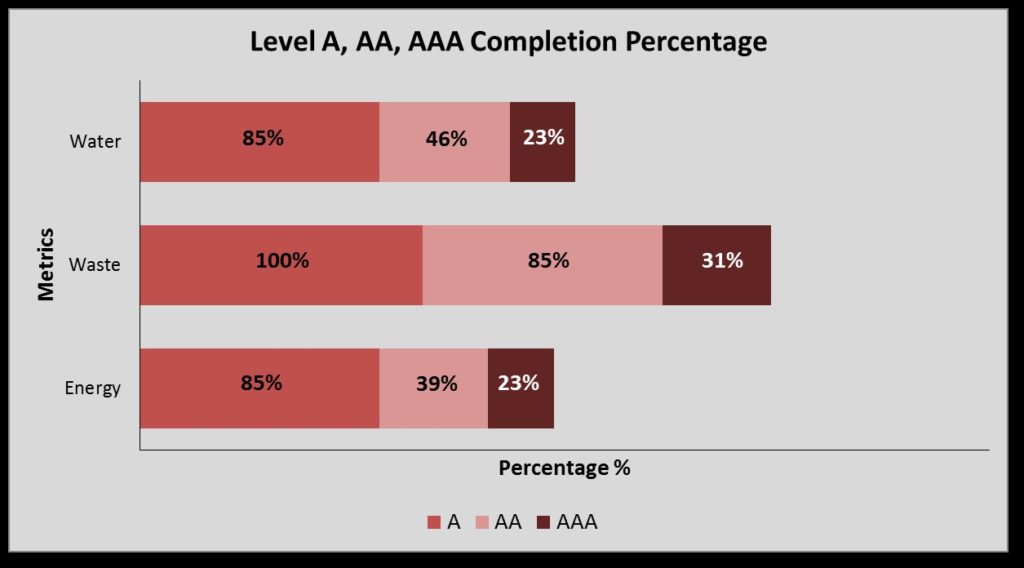Toolkit | Project
Manufacturing- Medical (Abbott Point of Care)
APOC: Toolkit Provides Method of Evaluating Sustainability Efforts
By: Shirley Ngai, Sustainability Coordinator – Abbott Point of Care
August, 2015
Abbott Point of Care (APOC) develops, manufactures and markets critical handheld medical diagnostic and data management products for rapid blood analysis at a patient’s bedside. The Ottawa Point of Care manufacturing plant is the global manufacturing site for cartridges used in the i-STAT® System: an advanced, handheld, diagnostic tool that provides real-time, lab-quality results within minutes. The i-STAT® is a market-leading handheld blood analyzer capable of performing a panel of commonly ordered blood tests on two or three drops of blood at the bedside. The i-STAT® System offers a diverse menu of blood gas, chemistry, coagulation and cardiac marker assays, which facilitates improved patient care by ease of use and rapid time to accurate results.
Abbott is a global healthcare company devoted to improving life through the development of products and technologies that span the breadth of healthcare. With a portfolio of leading, science-based offerings in diagnostics, medical devices, nutritionals and branded generic pharmaceuticals, Abbott serves people in more than 150 countries and employs approximately 70,000 people.
In Canada, Abbott has approximately 1,500 employees working in manufacturing, distribution and logistics, as well as sales and marketing. Primary locations in Canada are in Montreal, Markham, Mississauga, Brockville, Ottawa, Victoriaville and Edmonton.
The Toolkit provided a framework for establishing a formal method of evaluating the sustainability of environmental performance at APOC. Being ISO 14001 certified, APOC used the Toolkit against three of their existing Environmental Management System (EMS) priorities. The Toolkit identified that in order for the metrics of waste, water, and energy/emissions to reach a Level AAA status, the scope of the EMS would have to be further extended. In addition to providing a sustainability analysis of the current environmental priorities, the Toolkit gave APOC a better understanding of the path to quantifying and implementing other Sustainability Criteria, such as Operating Practices, Community, and Products & Services.
Three key environmental metrics (water, waste, and energy/emissions) defined by Abbott’s Global Environmental Health and Safety Policy (2014 Citizenship Report pg. 26) were used for the implementation of the Toolkit to analyze the completeness of the sustainability process integrated into APOC’s current EMS and environmental programs.
The table and graph below summarizes results from the assessment report.
| CRITERION: ENVIRONMENT |
| |
Level A |
Level AA |
Level AAA |
| Metric |
Initial Assessment |
Initial Assessment |
Initial Assessment |
| Water |
85% |
46% |
23% |
| Waste |
100% |
85% |
31% |
| Energy/Emissions |
85% |
39% |
23% |
Actions and recommendations were completed after the initial assessment, and the current statuses of the metrics are (August 2015):

Water – Level A
Waste – Level AA
Energy/Emissions – Level A
The implementation of the Sustainability Toolkit at APOC was successful. Further assessment of the other criteria and metrics will provide APOC with a more holistic evaluation of sustainability.
“The use of the Sustainability Toolkit provided a formal method to evaluate our three chosen environmental metrics. The Toolkit’s tiered approach using three levels of evaluation promotes continual improvement and allowed APOC to quantify progress in each of the assessed metrics. As a result, we now have clearly identified actionable opportunities and going forward we are better positioned to evaluate other sustainability criteria important to our stakeholders.”
Hans Loeffelholz, Sr. Environmental Health and Safety Specialist, Abbott Point of Care Canada Ltd.
 The research for this case study was funded with the support of a Mitacs Accelerate grant. For more information on the research project, please view our blog and white paper.
The research for this case study was funded with the support of a Mitacs Accelerate grant. For more information on the research project, please view our blog and white paper.



